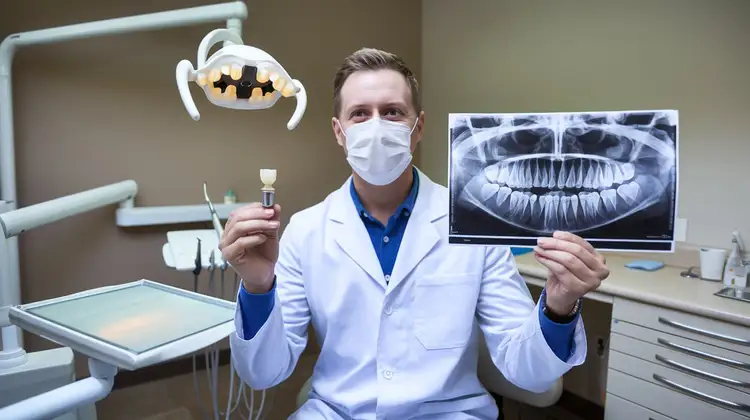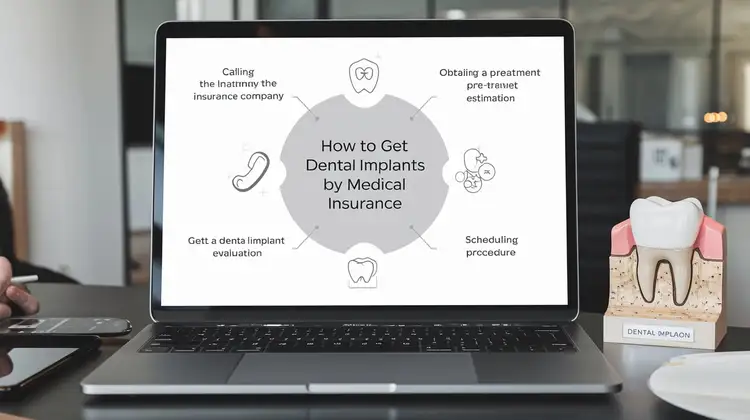Best How to get Dental implants covered by medical insurance
Published: 22 Jul 2025
Dental implants provide for a long-term replacement for missing teeth while improving functional and cosmetic appearance. But, the price can be very high. Knowledge of the ways of treating medical insurance to help cover dental implants can also help in reducing the costs. This detailed article looks at ways in which you can get health insurance with the aim of getting the treatment you need but at an affordable price.
1. Understanding Dental Implants
Dental implants are the artificial tooth roots that are usually in the shape of screws of titanium material, that is fixed into the jawbone to hold the artificial teeth. They offer a good base for either fully or partially made fixed or removable prosthetic work that can resemble natural teeth in both form and function.
Components of Dental Implants
- Implant Fixture: The tool of screw-like appearance that is placed into the jawbone.
- Abutment: Terms the implant fixture to the dead tooth or the tooth that is to be replaced.
- Prosthetic Crown: The portion that looks like a real tooth standing above the gum line.
How to Get Dental Implants Covered by Medical Insurance
| Method | Description | Eligibility | Potential Outcome |
|---|---|---|---|
| Medically Necessary Procedure | Dental implants are covered if they are deemed medically necessary due to an injury or health condition. | People with jawbone damage, accidents or medical conditions (e.g., cancer) | May be partially or fully covered by medical insurance |
| Consult Your Dentist | Your dentist can provide a letter of medical necessity to justify the implants as a required treatment. | Anyone who can demonstrate a medical need for implants | Increased chances of getting insurance coverage |
| Health Savings/Flexible Spending Accounts | Use pre-tax funds from HSA or FSA accounts to cover implant costs. | Anyone with access to an HSA or FSA | Helps reduce out-of-pocket expenses |
| Dual Coverage (Medical + Dental Insurance) | Leverage both medical and dental insurance to cover different aspects of the implant procedure. | Individuals with both medical and dental coverage | May help reduce the cost of the implant procedure |
Benefits of Dental Implants
- Durability: If well maintained, implants have the potential of sending their lifespan all the way up to the natural lifespan of the user.
- Improved Oral Health: They help to stop calcium in bone demineralisation and also support the facial skeleton.
- Enhanced Comfort and Speech: Implants do not cause pain and speech impediments as it is the case with dentures.

The Cost of Dental Implants
The cost of dental implants depend on the number of implants, need for other related procedures such as bone grafting and the area in which the treatment is being done. Altogether, an average cost of the implant ranges between $3,000 and $5,000, for a single implant at that.
Factors Influencing Cost
- Pre-Surgical Procedures: It may also be required that bone grafts or the removal of some teeth.
- Materials Used: Hence, the use of better quality in producing the product enables the cost to be higher.
- Dental Professional’s Expertise: Some specialists may offer their services at the cost higher than others.
Medical vs. Dental Insurance: What’s the Difference?
It is important that patient understands the difference between medical and dental insurance when looking for an insurance cover for implants.
Dental Insurance
- Scope: Essentially, encompasses checkups, scale and polish and filling and occasionally crowning.
- Limitations: Coverage can often be for an operation ranging from procedure exclusions such as implants or limited coverage.
Medical Insurance
- Scope: Included treatments that are considered medically necessary.
- Potential for Coverage: Yes an X-service may include dental implants if the dental implants are necessary for the patient’s overall health or is due to a medical necessity.
Medical Insurance Plans be used to Pay for Dental Implants?
Medical insurance may cover dental implants under specific circumstances:
- Accidental Injury: Any injuries which may experience a loss of teeth because of an accident may be covered.
- Medical Conditions: Cases of oral cancer or other developmental complications that require the placing of implants.
- Reconstruction After Surgery: Revision surgery using dental implant as a surgical procedure.

Key Considerations
Medical Necessity: This means that the procedure has to be one that must be considered for the health of the body, not for beauty purposes.
Documentation: In most cases, a number of medical records may be necessary coupled with a letter of medical necessity.
How to Ensure that You Get Dental Implants Paid by Your Medical Insurance
Securing coverage involves a strategic approach:
- Consult Your Dentist and Physician: Cooperate to set up the medical credibility of implants.
- Gather Comprehensive Documentation: Such as medical chart, diagnostic summary and management plans.
- Obtain a Letter of Medical Necessity: Something in writing from your doctor justifying it.”
- Submit a Pre-Authorization Request: First of all, have a word with your insurance provider before going for the procedure.
- Follow Up Diligently: It’s important to keep in touch with your insurer to have any issues cleared early enough.
About a Letter of Medical Necessity
The letter of medical necessity as the party immensely plays a significant role in obtaining insurance.
Essential Components
Patient’s Medical History: Stating what conditions call for implant placement in this case.
Detailed Diagnosis: Explain the conditions, which require dental implants.
Proposed Treatment Plan: Discuss the surgery implant and what it entails and what it aims to bring.
Justification of Medical Necessity: In your own opinion, why is this procedure necessary in the maintenance of health?
How to Get Dental Implants Covered by Medical Insurance
| Option | Details | Requirements | Impact on Coverage |
|---|---|---|---|
| Accident or Injury Coverage | If dental implants are needed due to an accident or injury, they may be considered medically necessary. | Documented injury or accident causing tooth loss or jawbone damage | Potential for full coverage under medical insurance |
| Medically Necessary Procedure | Implants may be covered if they are required for medical reasons, such as reconstructive surgery after cancer treatment. | Evidence of medical necessity (e.g., cancer treatment, jawbone disease) | Partially or fully covered depending on the policy |
| Dental Insurance with Implants Coverage | Some dental insurance plans may offer partial coverage for dental implants under specific plans. | Check your dental insurance for implant-specific coverage | Helps reduce out-of-pocket costs for the implant procedure |
| Appeal a Denied Claim | If an implant claim is denied, you can file an appeal with supporting medical documents. | Appeal with a letter from your dentist or medical professional explaining the necessity | Possibly overturn the decision and receive partial coverage |
Tips for an Effective Letter
Be Specific: Avoid measures that are broad; give specific information.
Use Medical Terminology: Use the right words in order to express the severity.
Include Supporting Evidence: Enclose specialist’s reports and other investigations that justify such essential needs.
Managing Insurance Pre Authorization
In insurance, pre-authorization is a requirement that is necessary for insurance before the implementation of the procedures.
Process Overview
Submission: Submit all necessary paperwork in order to the insurer.
Review: Insurance company assess the information for the purpose of completing an eligibility for coverage.
Decision: Such decisions include approval or denial, reasons included.
Tips for Success
Ensure Completeness: Such applications are likely to either be delayed or refused because they are not properly complete.
Be Timely: Request submission should be done earlier than the planned procedure.
Handling Insurance Denials
Rejection is discouraging but it is not the final stop ever.
Common Reasons for Denial
Lack of Medical Necessity: No evidence available to support one or both of the arguments.
Policy Exclusions: Finally, the procedure is considered an excluded service.
Incomplete Documentation: Lack of information or lack of sufficient information.
Appeal Process
Review Denial Letter: It is important to know why such denial is being made.
Gather Additional Evidence: Illustrate such things more fully or take other form of professional evidence.
Submit an Appeal: Stick to the insurers appeal process to the letter.
Seek External Review: That should be done if the internal grievances are not addressed to satisfaction can be resolved through seeking the help of an independent third party.
Alternative Financing Options
If insurance coverage is unattainable, explore other avenues:
Dental Financing Plans: Most dental offices accept credit and debit card payments Most dental offices provide their patients with a payment plan.
Medical Credit Cards: Healthcare credit card, which would be targeted to specific speciality.
Health Savings Accounts (HSAs): You can mainly spend pre-tax coins for medical bills.
Dental Schools: Those affordable services by the services rendered by the post-graduate students supervised.

Measures To Avoid Measures to eliminate future costs
Maintaining oral health can prevent the need for costly procedures:
Regular Dental Check-Ups: Early detection of issues.
Proper Oral Hygiene: Brushing one’s teeth and flossing then rinsing the mouth with mouthwash each and every day.
Healthy Diet: Restriction of products containing high amounts of sugar content.
Avoid Tobacco Products: ,Smoking is also disadvantageous in the development of dental issues.
FAQs
Must medical insurance pay for dental implants?
Yes, if needed for medical reasons such oral cancer or accident.
What is the letter of medical necessity?
A letter from your healthcare provider that will justify the need for any procedure to be undertaking on you.
However, does my insurance even cover it if they deny my claims?
In fact the decision can be appealed by typing in a new reason for the declaration and adding complex explanations.
What other possibilities are there when insurance does not pay for implants?
Yes, it includes financing plans, medical credit card and services from dental schools.
What measures should be taken in order to avoid getting dental implants?
It’s important to brush your teeth and clean your tongue and you should go to the dentist at least twice a year and it’s also much better if you don’t smoke.
Does every dental insurance even cover implants?
Not all, but many do. It is always important to read your policy or even talk to your insurance company.

Conclusion
Obtaining authorization for the coverage of dental implants entails effort, properly planning and good patient –insurer relations. This way you might succeed in getting approval for a procedure as you are fully aware of your policy, collected all the documents required and explained the medical necessity of the procedure to the insurance provider.
In case insurance coverage is not feasible, the financial maneuvering makes the process less costly. When placed, implants not only correct a person’s appearance but also help him or her recover health and increase the quality of life. Here number one mistake don’t let financial issues hinder your way from choosing this life-transforming procedure. Don’t sit idly, speak to your doctors and achieve all that is possible to get your needs met.

- Be Respectful
- Stay Relevant
- Stay Positive
- True Feedback
- Encourage Discussion
- Avoid Spamming
- No Fake News
- Don't Copy-Paste
- No Personal Attacks

- Be Respectful
- Stay Relevant
- Stay Positive
- True Feedback
- Encourage Discussion
- Avoid Spamming
- No Fake News
- Don't Copy-Paste
- No Personal Attacks





